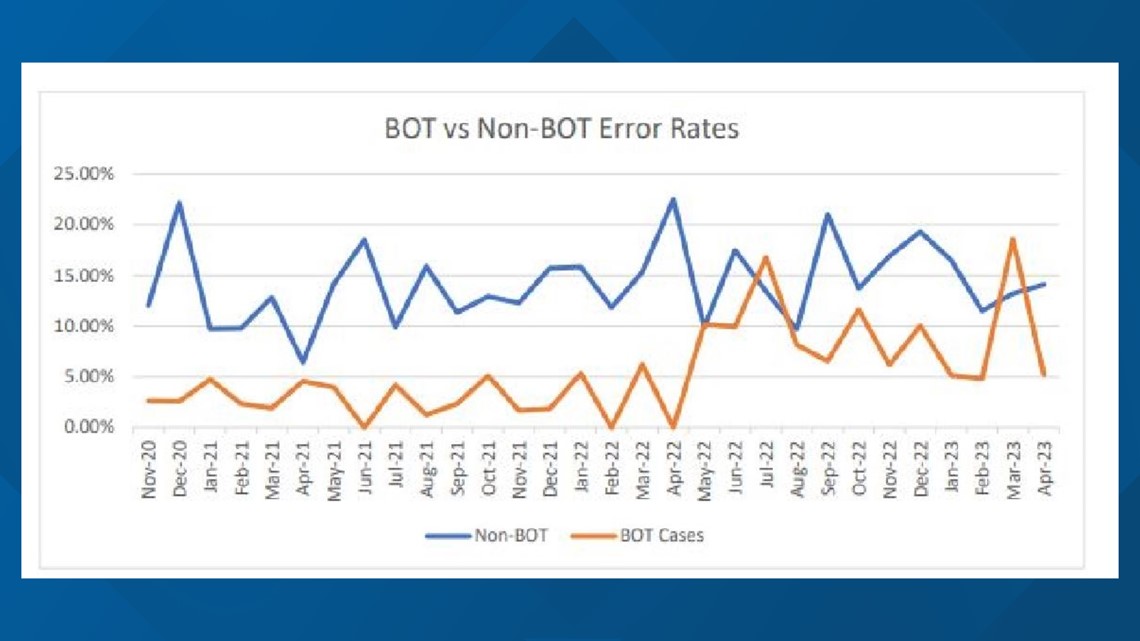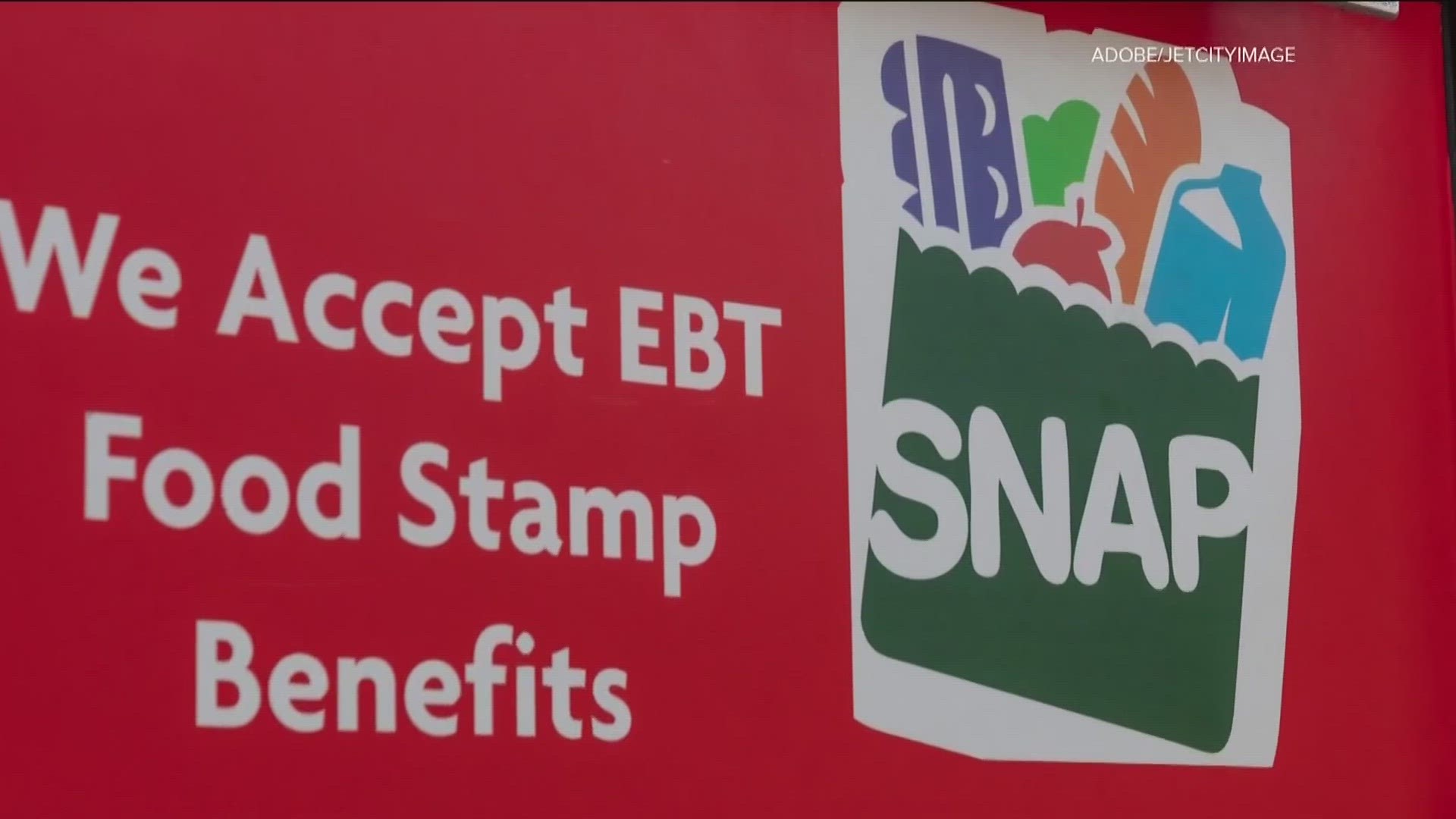ATLANTA — In a new letter from the USDA Food and Nutrition Service, federal regulators show their concern about Georgia’s administration of the Supplemental Nutrition Assistance Program, or SNAP, which serves the nutrition needs of low-income families. The letter indicates the state is not meeting federal requirements and includes recommendations to address the backlog amid concerns the issue will continue into the fall.
Georgia, meanwhile, continues its push for more technology to ease the process, indicating the state feels held back as the USDA warns AI and bots could potentially worsen the situation.
The federal government and state’s positions are laid out in a pair of letters, the first of which is dated August 24 and sent from the USDA to Georgia Department of Human Services Commissioner Candice Broce. The letter states Georgia’s “extensive recertification processing backlog is causing multiple-month-long delays for current SNAP households to receive their benefits.”
The USDA believes the most recent backlog, which 11Alive began reporting on in June, is due in part to staffing issues and Georgia’s “failure to properly manage workload" - a workload worsened, according to the USDA, by the state’s requests for several federal waivers from October 2022 thru February 2023. The waivers allowed for the continuation of benefits for Georgians as the USDA said the state dealt with a range of problems including a “system security issue,” customer portal access, as well as severe storms that prevented families in seven counties from renewing on time.
“FNS advised the State to distribute the cases in a way to even out the number of recertifications due over the 6-month period, and the State confirmed they would do so to the best of their ability,” the letter states. “FNS is concerned that Georgia extended these certification periods without putting workload management controls in place, thus contributing the backlog.”
The state meanwhile argues they have "exhausted our options within the bounds of our authority" and "need our federal partners to take action" in approving waivers for technology they assert would go a long way toward alleviating the backlog, because "no state can hire its way out of this crisis."
Left in limbo in the middle of this back-and-forth are the families whose SNAP benefits have been held up.
“SNAP helps families put nutritious food on the table. When SNAP benefits are delayed or taken away, it does real harm,” Ty Jones, Vice President for Food Assistance for the Center on Budget and Policy Priorities, said. “A mom may be forced to choose between paying the bills and feeding her family. A child may go to bed hungry. And over time we know that not getting enough nutritious food to eat affects a child’s health and how well they do in school.”
Full FNS letter, Aug 24, 2023
Full Georgia response, Aug. 30, 2023
USDA AND GEORGIA AT ODDS OVER SOLUTIONS
To date, talks of solutions have been ongoing, a spokesperson from the USDA FNS emphasized to 11Alive.
The letter from the USDA also lays out a series of recommendations for the state, one of which includes Georgia opting for a 12-month certification process, in lieu of a 6-month certification period. The flexibility has been an option for states for more than a decade, Georgetown Law professor and policy expert David Super said.
“The simple solution to me is if you want to do less with recertifications, why don't you just do half as many and then you'll have the resources to do them properly,” Super said.
In her August 30 response, Commissioner Broce said Georgia is already working on some of the USDA’s recommendations, citing that DHS opted to extend certification periods for select SNAP groups, as the agency explores whether to do the same for other households.
Broce also addressed staffing concerns in response to the USDA highlighting what it said was a 70% retention rate. The commissioner said the department has hired 700 employees since January, adding the agency is seeing a lower turnover rate compared to last year.
Separately, DHS presented that progress in a recent Aug. 30 DFCS State Advisory Board Meeting, showing an improvement in recent months in frontline staffing numbers and caseload levels. The average caseload in July was 981, compared to more than 1,100 in April 2023.
“I must reiterate that no state can hire its way out of this crisis,” the commissioner’s letter to the USDA said. “We have poured our blood, sweat, and tears into hiring and retention. We have raised pay, solicited feedback, kept you apprised at every turn, and recognized where we need improvements. We have exhausted our options within the bound of our authority. We need our federal partners to take action.”
That call for action - Georgia’s push for automation for parts of the SNAP certification process - nevertheless remains a sticking point between the two agencies. Broce writes that “more BOT technology is the right path forward,” a plan she said has staff support, while the USDA FNS tells 11Alive federal regulators do not think bots are the answer.
“While FNS supports innovation and modernization in the program, FNS does not believe that outsourcing most of Georgia’s SNAP application processing to automation will address the root causes of poor timelines the state is experiencing,” a statement reads. “In 2020, the state began using automated programs for some components of its application processing as part of a pilot program, and the data shows errors and processing delays increased. Therefore, we do not believe additional use of bots will help Georgia resolve its challenges and may even make the problem worse. FNS believes Georgia must address underlying policy and operational issues first as a priority.”
The commissioner disputes such a position in her letter, including a graph showing “historic error rates for BOT-assisted cases are dramatically lower than non-BOT-assisted cases except for a mere three months’ time, which is easily distinguishable due to small sample sizes.”


NEXT STEPS
The USDA said there’s no given timeline at this point for which Georgia must report improvements, and a spokesperson for the Georgia Department of Human Services said state leaders have not yet heard back from the federal agency.
However, Super said that if such problems persist, Georgia risks losing federal administrative funds for the program.
“For now, FNS is trying to work in a positive way with the state,” Super said after reviewing the two letters. “But the degree to which the state is out of compliance is going to force FNS to act against the state fairly soon, the same way they have in the past.”
As for how many states have received letters like this? The USDA would not answer that question, but Super said in his experience, only a handful of states reach this stage each year.
“It's intended to be a big deal,” he said.
Georgia, for its part, takes the position in Broce's letter that the state has legal ground to move ahead with the bot technology with or without federal approval, but that, "Georgia wishes to pursue SNAP ex parte waiver implementation with FNS leadership’s vocal support."
11Alive viewers who want to speak with a reporter about the delays can email the newsroom.

